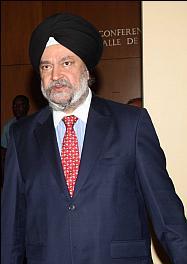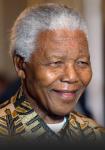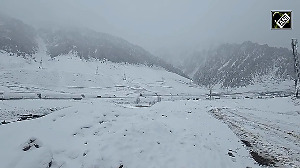 Hardeep Singh Puri, India's permanent representative to the United Nations discusses UN reform with Suman Guha Mozumder.
Hardeep Singh Puri, India's permanent representative to the United Nations discusses UN reform with Suman Guha Mozumder.More than a decade after India launched a spirited campaign for a United Nations Comprehensive Convention on International Terrorism as well as reform of the UN Security Council, both in the permanent and non-permanent categories, there is renewed hope that both campaigns may succeed, thanks to India's untiring diplomatic efforts at the world body. Ambassador Hardeep Singh Puri, India's permanent representative to the United Nations, says there is reason for optimism for Security Council reform, "but at the end of the day it is a political call."
Where does this UN Comprehensive Convention on International Terrorism, for which India has been making a pitch for so many years, stand? Is it moving forward?
You are right when you say that the proposal to negotiate a comprehensive convention has been on the table for 12 years, but we must a draw a distinction. The situation is now qualitatively different as there is now a formal text on the table. This text, called the 2009 package, reflects the work that has been done in the previous years. There are only one or two small remaining issues left.
So what is the outlook?
What I see happening is that the discussions will take place on the package which is on the table and these discussions will hopefully result in narrowing of the differences on one or two issues that are remaining and then we will get enough time between the meetings this year to finally adopt the Comprehensive Convention on International Terrorism. This is the best case scenario I can think of.
There is a discussion on whether the 2002 text would be preferable over the 2009 text but I think if anyone who has the time to look at both texts and can point out substantive differences between the two, then I will be willing to enter into a discussion. I feel that as a result of protracted discussions and negotiations we have a reached a stage where the 2009 text package is qualitatively not different from the 2002 text.
This gives me hope and I can only say that political will is needed. Because at the end of the day you can get a very good text, but if the parties to the negotiations are reluctant to move forward decisively by showing the requisite political will, then the text itself is not much help.
My expectations is that given the goodwill that has been generated everyone would be agreed that terrorism is something on which the international community stands united and that terrorism in whatever form cannot be condoned. I hope parties to the negotiations can rise above the problems that they have with the other parties. There are issues emanating from the Middle East and there are other issues that tend to visit this negotiating process. Once the realization is there that conclusion of this is in everyone's interest, and provides a win-win for each negotiating party, then it would result in the CCIT seeing the light of the day. I am more optimistic now than at anytime earlier and certainly in a year or so that I have been here.
There were earlier disagreements on the definition of international terrorism and a distinction was sought to be made between State actors and non-State actors.
I believe that issue has largely been resolved. It would not be appropriate for me to make a pronouncement on that. Everyone reads the text in terms of his or her understanding. But there are a few issues that this convention can address and then there are other issues which have to be dealt in under international humanitarian law. I believe this is the closest proximation that you can get to a comprehensive convention on terrorism. I think almost all the outstanding issues have been addressed.
What are the minor outstanding issues?
One of them relates to what you just mentioned and also one on the exclusion of the armed forces of a State (from the purview of the convention)
Do other member States share your optimism?
Certainly it is shared by those with whom I had discussions. But, as I said, at the end of the day it is a political call.
The open ended discussion on Security Council reform has now moved to intergovernmental negotiations and at a press conference Afghan Ambassador Zahir Tanin, chair, intergovernmental negotiations, said that things are beginning to look up and that all member States had been requested to send proposals and positions before March 5. Has India sent the proposals?
 For many years discussions took place under what is called the open ended working group. These discussions were by their very definition were open ended and they were not formal negotiations. But as of March last year, we have moved to a formal phase of intergovernmental negotiations and four rounds have been completed. These are now going to be text-based negotiations.
For many years discussions took place under what is called the open ended working group. These discussions were by their very definition were open ended and they were not formal negotiations. But as of March last year, we have moved to a formal phase of intergovernmental negotiations and four rounds have been completed. These are now going to be text-based negotiations.
In any demand for reform those who seek reform are confronted by those who are comfortable with the status quo. As in all such cases you have to demonstrate as to who has greater number on their sides. An amendment of the charter can only take place only with two thirds majority in the first instance. Therefore, realizing this, the G-4, which consists of Brazil, India, Germany and Japan, decided towards the end of the last year that we need to demonstrate that the demand for expansion in both permanent and non-permanent categories enjoyed the requisite support. We could have put this to vote. But we thought in stead of asking for a vote on this issue we could do it slightly differently.
We decided to address a communication signed by 139 countries. This letter would have got more support but after we got more than 128, we wanted to submit it. Thereafter, a large number of countries have spoken to us saying they wanted to support this and join this. They are still free to join. So we have demonstrated that the requisite support is there.
So, has India submitted the proposals?
The chairman has to produce the text. The Afghan ambassador gave March 5 as the deadline. As far as India is concerned, the G-4 has submitted a letter and the original G-4 proposal of 2005 has been resubmitted. Other interested countries have sent their proposals. It is my expectation that the chairman of the negotiating group, Ambassador Tanin, will put all these together, and then there will be a fifth round of discussions and those discussions will be qualitatively different from earlier discussions because they will be addressing a chairman's text in a formal text of negotiations.
The process could take time, but please note that we in the history of the UN have not reached this point earlier. I do not want to prejudge the issue. The question today is not whether we will get reform or not. I think that question has been answered--we will get reform. What we need to address is reform in what shape and by then. I think the two are interlinked because if you want half-hearted reform, you can get it very quickly. There are suggestions for pragmatic intermediate solutions.
So, when do you see this happening?
This is only April and this is not the only activity on the table. My assessment is that issue of Security Council reform will come to head next year. Ambassador Tanin said he is going to produce the text in the second half of April, but then people will have to absorb the text and they have to comment on the text. Those negotiations will be extended and drawn out and at the end of that process, we will see another text where clearly options which are not viable or do not have support will be left out. But we will have to go through that process.
I think the chairman said that once the text is produced it is not going to be narrowed down in terms of choices and options. Do you see that as a problem?
No, I do not. Firstly, we need to give assurance to all members that their proposals are reflected. This means that they must be given the satisfaction of seeing their proposals in writing. They must also have the satisfaction that others have commented on it. Let us say for example, hypothetically, that someone suggests that let's wind up the Security Council. That is an option that some nation can put on the table. But if 185 countries speak up against it, clearly in the options paper that will appear this will not be a viable option.
How optimistic are you about India's chances of making it into the Security Council next year as a non-permanent member?
When we started off for this in 2006, there were two other candidates, Thailand and Kazakhstan. Thailand withdrew and then in December of 2009 Kazakhstan withdrew from the race and we were endorsed by the Asian group in March 2010. So, now we are the only candidate and the only endorsed candidate. Now we have to go through the formal election process in October.
That is just a formality, right?
I won't say that. We will have to go through the process and we have to get 128 votes. But I am reasonably sure that we will get the required number of votes to make it to the Security Council table in January 2011.
Certainly it is shared by those with whom I had discussions. But, as I said, at the end of the day it is a political call.
The open ended discussion on Security Council reform has now moved to intergovernmental negotiations and at a press conference Afghan Ambassador Zahir Tanin, chair, intergovernmental negotiations, said that things are beginning to look up and that all member States had been requested to send proposals and positions before March 5. Has India sent the proposals?
 For many years discussions took place under what is called the open ended working group. These discussions were by their very definition were open ended and they were not formal negotiations. But as of March last year, we have moved to a formal phase of intergovernmental negotiations and four rounds have been completed. These are now going to be text-based negotiations.
For many years discussions took place under what is called the open ended working group. These discussions were by their very definition were open ended and they were not formal negotiations. But as of March last year, we have moved to a formal phase of intergovernmental negotiations and four rounds have been completed. These are now going to be text-based negotiations. In any demand for reform those who seek reform are confronted by those who are comfortable with the status quo. As in all such cases you have to demonstrate as to who has greater number on their sides. An amendment of the charter can only take place only with two thirds majority in the first instance. Therefore, realizing this, the G-4, which consists of Brazil, India, Germany and Japan, decided towards the end of the last year that we need to demonstrate that the demand for expansion in both permanent and non-permanent categories enjoyed the requisite support. We could have put this to vote. But we thought in stead of asking for a vote on this issue we could do it slightly differently.
We decided to address a communication signed by 139 countries. This letter would have got more support but after we got more than 128, we wanted to submit it. Thereafter, a large number of countries have spoken to us saying they wanted to support this and join this. They are still free to join. So we have demonstrated that the requisite support is there.
So, has India submitted the proposals?
The chairman has to produce the text. The Afghan ambassador gave March 5 as the deadline. As far as India is concerned, the G-4 has submitted a letter and the original G-4 proposal of 2005 has been resubmitted. Other interested countries have sent their proposals. It is my expectation that the chairman of the negotiating group, Ambassador Tanin, will put all these together, and then there will be a fifth round of discussions and those discussions will be qualitatively different from earlier discussions because they will be addressing a chairman's text in a formal text of negotiations.
The process could take time, but please note that we in the history of the UN have not reached this point earlier. I do not want to prejudge the issue. The question today is not whether we will get reform or not. I think that question has been answered--we will get reform. What we need to address is reform in what shape and by then. I think the two are interlinked because if you want half-hearted reform, you can get it very quickly. There are suggestions for pragmatic intermediate solutions.
So, when do you see this happening?
This is only April and this is not the only activity on the table. My assessment is that issue of Security Council reform will come to head next year. Ambassador Tanin said he is going to produce the text in the second half of April, but then people will have to absorb the text and they have to comment on the text. Those negotiations will be extended and drawn out and at the end of that process, we will see another text where clearly options which are not viable or do not have support will be left out. But we will have to go through that process.
I think the chairman said that once the text is produced it is not going to be narrowed down in terms of choices and options. Do you see that as a problem?
No, I do not. Firstly, we need to give assurance to all members that their proposals are reflected. This means that they must be given the satisfaction of seeing their proposals in writing. They must also have the satisfaction that others have commented on it. Let us say for example, hypothetically, that someone suggests that let's wind up the Security Council. That is an option that some nation can put on the table. But if 185 countries speak up against it, clearly in the options paper that will appear this will not be a viable option.
How optimistic are you about India's chances of making it into the Security Council next year as a non-permanent member?
When we started off for this in 2006, there were two other candidates, Thailand and Kazakhstan. Thailand withdrew and then in December of 2009 Kazakhstan withdrew from the race and we were endorsed by the Asian group in March 2010. So, now we are the only candidate and the only endorsed candidate. Now we have to go through the formal election process in October.
That is just a formality, right?
I won't say that. We will have to go through the process and we have to get 128 votes. But I am reasonably sure that we will get the required number of votes to make it to the Security Council table in January 2011.
Image: Hardeep Puri | Photograph: Jay Mandal






 © 2025
© 2025